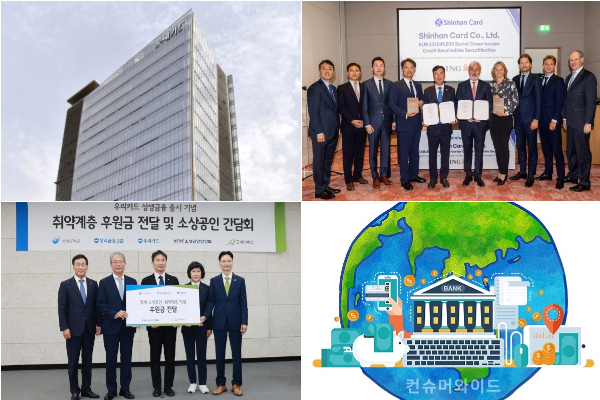
[Consumerwide-Youngchul, Woo Reporter/ Yohan, Bok Reporter] The credit card industry, including Lottecard, began supporting low-income households with financial services. In particular, the ESG practices will be implemented through financial support for citizens with insufficient credit and low-income households, which can lead to value consumption in the big picture. Referring to the industry on the 30th, a domestic ESG ABCP (Asset-Backed Commercial Paper) worth 300 bn won was issued by Lottecard on the 29th. An ABCP is a bill issued by a Special Purpose Company (SPC), which is backed by trade receivables or corporate bonds. The Lottecard issued ABCP as a Social bond based on the ESG framework which had been qualified by the global ESG certification agency, Sustainalytics, in 2021.
Those funds raised are aimed at providing financial services for low-income households. Starting in 2020, Lottecard has been issuing ESG bonds to support socially vulnerable groups, which are low-income households and small and medium-sized businesses. The accumulated amount of assets is 1.324 tn won. An associated person of Lottecard said, "We were able to succeed in issuing ABCP based on credit card assets with great creditworthiness in cooperation with banks in the domestic area, which eventually led us to obtain stable market liquidity. Hope this may carry further to stimulate asset-backed securities markets concerning domestic investors."
Shinhan Card, too, has secured financial service provision for low-income households. It has succeeded in issuing overseas asset-backed securities (ABS) worth 320 bn won (230 Mn euros). This ABS was issued as a social ABS in cooperation with ING Bank, which is one of the leading ESG financing banks. Raised funds are used to support vulnerable social groups, including low-credit and low-income households in Korea. An official from Shinhan Card said, "We will keep striving to practice our ESG financial strategy for increase of social values and environmental management."
Wooricard is facilitating the "win-win financing No.1” project aimed at financially vulnerable groups and small business owners, which is the first time in industry history. The "Win-Win Finance No. 1" plan contains skin-felt plans, including debt normalization programs for financially vulnerable citizens and marketing support for small business owners. The total support is about 220 bn won. A debt normalization program is offered for the financially vulnerable group, who are having difficulties repaying debts, and according to the program, the annual bond reduction ratio is 10% points expanded.
A max. of 70% debt reduction will be offered to citizens with significant uneasiness, including the victims of lease fraud. Additionally, a win-win loan has been released, which will cut interest rates down to 50% compared to existing loans, and 4% point discounted credit loan rates are offered to low-income citizens with an annual income of under 20 Mn won. Small and medium-sized business owners will get a 1% discount on the corporate card bill for business use. Each project has a different service offering period, and when it reaches the limit of budget, services are closed.
Besides, Wooricard has donated 200 Mn won to Good-Neighbors to support the daily needs of vulnerable groups. Hereafter, they are planning to facilitate various win-win financing projects by organizing and discovering professional bodies and consulting centers while actively getting involved in debt adjustment and normalization. An official from Wooricard said, "We are also planning to carry out social contribution projects related to "Win-win finance No. 1", which purchases products from small businesses while donating to socially vulnerable groups. I am hoping this will become a basement for financial independence and circulation in the long term."
- [Consumption value-ESG] Public Institutes and banks are issuing ESG bonds... What are the goals of funding and ESG management?
- [Consumption value-ESG] Businesses are strengthening ESG management by publishing ESG reports and cooperation
- [Consumption value-ESG] Beauty and fashion industries are practicing ESG with social contribution activities.
- [Consumption Value-ESG] Businesses are practicing environmental cleaning and ESG management through plogging.
- [Consumption value-ESG] The beauty industries support our teens, and restoration of birds' nests.
- [Consumption value-ESG] The fashion and beauty industries are reducing carbon emissions through facilitating a playground using recycled materials and various activities.
- [Consumption value-ESG] Portal sites including Naver, Kakao are practicing ESG.
- [Consumption value-ESG] 3 major delivery app businesses are practicing ESG by caring for riders in heavy rain and extreme heat... Leading value consumption
- [Consumption value-ESG] Food industries are continuing to publish ESG reports... pursuing sustainable management.
- [Consumption value-ESG] Donations for independence of young adults and low income families... Participation challenge for staff and executives
- [Consumption value-ESG] Banks began expanding ESG through supporting small business owners and local businesses by offering ESG consultations.
- [Consumption value-ESG] The fashion industry has donated to help victims of heavy rain.
- [Consumption value-ESG] Steps of beauty and fashion industries regarding sustainable future and animal protection value
- [Consumption value-ESG] Large businesses in domestic area are continually donating for the restoration of flooded areas due to heavy rain.
- [Consumption value-ESG] Businesses are practicing ESG and begin supporting environmental energy solar module for shared growth with associated businesses
- [Consumption value-ESG] LG Ensol, Korea Water Resources Corporation, Busan Bank are issuing Green Bonds.

